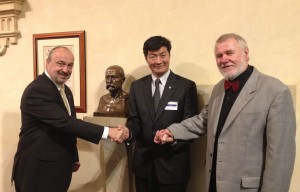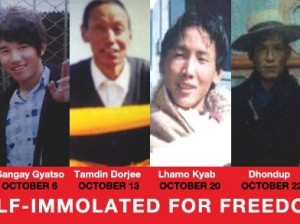
Senator Petr Bratský, the Chairman of Tibet group in the Czech Senate, Dr. Lobsang Sangay, and Senator Jaromír Štětina
Sikyong Dr. Lobsang Sangay attended the 16th annual international conference, Forum 2000, in Prague, Czech Republic, from 21 to 23 October. The three day conference, in accordance with the wishes of the late Václav Havel, focused on the relationship between democracy and the media. For the first time in its 16-year long history, the towering presence of former President Havel was missing from the talks, but organizers say his legacy was honored during the event.
The Forum 2000 was founded in 1996 as a joint initiative of the late Czech President Václav Havel, Japanese philanthropist Yohei Sasakawa, and Nobel Peace Prize Laureate Elie Wiesel. The Forum 2000 Foundation pursues the legacy of Václav Havel by supporting the values of democracy and respect for human rights, assisting in the development of civil society, and encouraging religious, cultural and ethnic tolerance. It provides a platform for global leaders, as well as thinkers and courageous individuals from every field of endeavor, to openly debate and share these critical issues.
According to the Forum 2000 Foundation’s Executive Director Jakub Klepal, “with his well known interest in the fate of Tibet, I am convinced that Václav Havel would welcome Lobsang Sangay’s participation in this year’s conference.” Havel was the first head of state to invite His Holiness the Dalai Lama for an official visit
Havel was interested in the role of the media, the crucial impact it plays in non-democratic countries, and the importance of the Internet in revealing atrocities and injustices. He was also intrigued by how technological developments are affecting responsibility and accountability, and the interdependencies between business, economy, and the media. As U.S. Secretary of State Madeleine Albright stated, “It is no accident that political confrontations frequently begin with efforts to control the media.”
Dr. Sangay spoke of censorship by the Chinese government and the “great firewall,” the most stringent censorship found on the Internet. He explained about the self-immolations by Tibetans and how they were due to lack of freedom of speech and media in Tibet. Peaceful methods of protests by Tibetans lead to arrest and torture, followed by repression, resulting in further resentments among Tibetans.
“We seek genuine autonomy within China and within the framework of the Chinese constitution, that is what we call middle-way policy,” stated Dr. Lobsang Sangay. He also added that Tibetans deserved to take part in the administration of their country, including active involvement in the economy, education, environment, and other issues. Mr Sangay described the situation in Tibet as a country under occupation.
Dr. Lobsang Sangay noted that the modern history of the Czech Republic and the personality of Václav Havel were great inspirations for the Tibetan people. His Holiness the Dalai Lama, who was a friend of Václav Havel, will visit Prague next year.




 Print
Print Email
Email